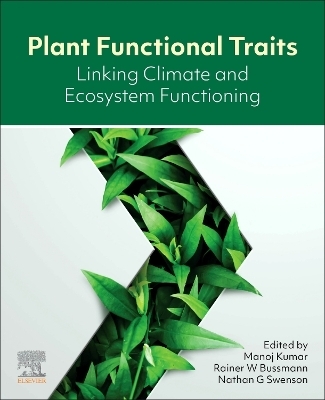
Plant Functional Traits
Elsevier - Health Sciences Division (Verlag)
978-0-443-13367-1 (ISBN)
- Noch nicht erschienen (ca. Februar 2025)
- Versandkostenfrei innerhalb Deutschlands
- Auch auf Rechnung
- Verfügbarkeit in der Filiale vor Ort prüfen
- Artikel merken
Additional information includes applications in the development of new generation of Dynamic Global Vegetation Model (DGVM) and an understanding of the response of vegetation to changing environments.
Dr. Kumar is a senior scientist working at Indian Council of Forestry Research & Education, Ministry of Environment, Forest & Climate Change, Government of India. Kumar primarily works in the field of forestry, environment, climate change, and related interdisciplinary fields with wider applications of Information Technology, Remote Sensing and GIS tools and has a working experience of more than fifteen years. His research area includes testing and development of dynamic vegetation models for the climate change impact studies. He has initiated work on developing forest growth simulation model (ForestInfo) to study functional relationship of plants with the environment that could be used for climate change impact studies and has published high impact international papers on various themes of agriculture, forestry, environment, and climate change. He has successfully implemented more than twenty research projects funded by national and international agencies. Prof. Dr. Rainer W. Bussmann is a vegetation ecologist and an ethnobotanist. He is Head and Full Professor at the Department of Ethnobotany, Institute of Botany, Ilia State University, Georgia. Before moving to Georgia, he was director of William L. Brown Center at Missouri Botanical Garden, USA. He held academic appointments as Associate Professor of Botany and Scientific Director of Harold Lyon Arboretum at University of Hawaii, USA and Assistant Professor at University of Bayreuth, Germany. He holds affiliate appointments and serves as external thesis advisor at universities worldwide. He has authored over 330 peer-reviewed papers, over 1200 peer-reviewed book chapters, and authored or edited 38 books. According to Stanford University, he is recognized among the 2% most influential scientists worldwide. He is past President of the Society for Economic Botany and has served as board/council member of the Botanical Society of America, and International Society of Ethnobiology. Prof. Swenson is a world expert in the ecology and evolution of tree species. His work focuses on the functional and historical processes that determine the performance, distribution and dynamics of trees across space and time. He obtained his Ph.D. from the University of Arizona and was a National Science Foundation Postdoctoral Fellow at Harvard University. He is currently the Gillen Director of the University of Notre Dame Environmental Research Center. He has published 2 books and over 160 peer reviewed papers including in journals such as Science, Nature and PNAS. Prof. Swenson has received multiple international awards including being named a Fellow of the John Simon Guggenheim Memorial Foundation, a Highly Cited Researcher by Clarivate Analytics and a recipient of the Ebbe Nielsen Prize from the Global Biodiversity Information Facility.
1. Plant functional traits: The scientific basis and their significance in climate change impact studies
Section I: Plant functional traits: the scientific basis
2. Plant functional traits: synthesis of current status and available information
3. Unravelling the relationship between plant functional traits and environment
4. Functional traits as determinants of plant performance
5. Driving mechanism of functional trait variations in a forest ecosystem
6. Belowground traits and their importance in ecological studies
Section II: Functional relationship between trait and environment
7. A review of plant–environment interactions
8. Significance of trait and environment relations in ecological studies
9. Plant functional traits for assessing impacts of climate change
10. Traits explaining occurrence and abundance of plants
11. Environmental conditions influencing the distribution of plant functional traits
Section III: Ecosystem services and plant functional traits
12. Plant functional traits and soil carbon dynamics
13. Selection of appropriate functional traits and its application to evaluate ecosystem service
14. Trait-based selection of suitable plant species to restore the degraded ecosystems
15. Monitoring canopy functional traits using remote sensing
16. Hyperspectral remote sensing for monitoring plant functional traits
17. Monitoring and modelling of functional relationship of plant traits with environment
18. Investigating the origins and effects of intraspecific trait variations
19. Monitoring of plant functional traits as indicator of air quality
20. Synthesizing functional trait data to understand global patterns and processes of vegetation: gaps and biases
Section V: Functional traits and vegetation models
21. Linking biophysical models with functional traits for ecological studies
22. Representing functional traits in earth system models to understand coupled biosphere-atmosphere interactions
23. Modelling the relationships between traits, climate, and life history strategies
| Erscheint lt. Verlag | 28.2.2025 |
|---|---|
| Reihe/Serie | Plant Biology, sustainability and climate change |
| Verlagsort | Philadelphia |
| Sprache | englisch |
| Maße | 191 x 235 mm |
| Gewicht | 450 g |
| Themenwelt | Naturwissenschaften ► Biologie ► Biochemie |
| Naturwissenschaften ► Biologie ► Botanik | |
| Naturwissenschaften ► Biologie ► Genetik / Molekularbiologie | |
| Weitere Fachgebiete ► Land- / Forstwirtschaft / Fischerei | |
| ISBN-10 | 0-443-13367-0 / 0443133670 |
| ISBN-13 | 978-0-443-13367-1 / 9780443133671 |
| Zustand | Neuware |
| Informationen gemäß Produktsicherheitsverordnung (GPSR) | |
| Haben Sie eine Frage zum Produkt? |
aus dem Bereich


